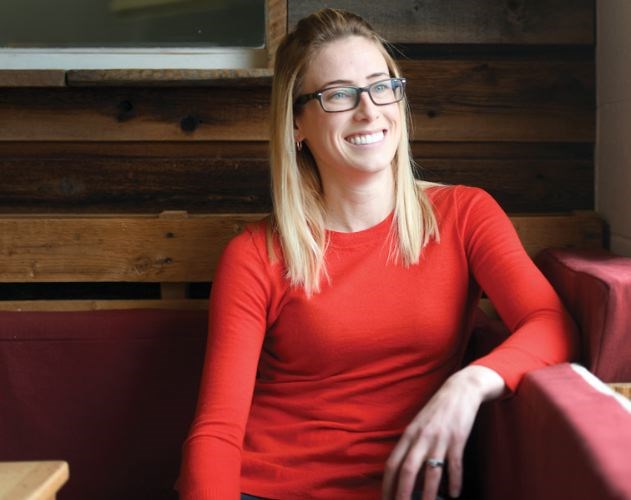Jenna Smith-Forrester's entry into the medical profession came after observing the system from the perspective of a patient.
The Northern Medical Program student, who was recently recognized with the Rising Star award during this month's Bob Ewert Memorial Dinner, had a firsthand view of the medical profession as a young child after her brother was diagnosed with leukemia.
"I don't come from a family of doctors, I come from a family of patients," she said.
Smith-Forrester eventually developed a keen interest in the human brain and enrolled to study neuroscience at Dalhousie as an undergraduate. She said her previous experience watching medical staff interact with patients imbued the mysteries of the brain with a sort of romanticism.
"We were in the room with neurosurgeons and everything. They were kind of the heroes, early on in my life," she said.
But Smith-Forrester does not believe she received the Rising Star award because of her considerable resume in neuroscience. When asked about the award, she points to her significant work on the often-unsung practice of quality improvement, a discipline which aims to improve medical outcomes, efficiencies and the abilities of medical staff to problem-solve.
Smith-Forrester became immersed in the world of quality improvement during her undergraduate years. During a volunteer healthcare trip, she observed a medical team lead, who happened to be a doctor at the prestigious Mayo Clinic, take a team of students out into rural communities. Each would be given five cue cards. The students were instructed to write compliments of their colleagues related to problems they had solved over the course of the day on four of these cards. One cue card was reserved for suggested improvements.
The exercise would culminate each evening in a debrief session, in which team members would highlight each other's strengths and ideas.
"It made a huge impact," Smith-Forrester said. "It was a really great way for crowd-sourcing ideas."
Years later, after obtaining a master's in neuroscience at UBC, Smith-Forrester became involved with the UBC chapter of the Institute for Healthcare Improvement, an international organization which provides training and education related to quality improvement.
"When you're looking at high efficiency systems, like the airline industry, that's where a lot of healthcare has borrowed ideas - their checklists, pre-flight checklists. We have operative checklists that were basically adapted from that approach," she said.
"So it's just a lot of organizational learning, approaches to team-based care, improving delivery and reducing waste. Trying to improve overall outcomes and reduce overall costs. So I thought it was very relevant to be integrated into my medical education."
Her work on quality improvement in B.C. has already had significant impacts on Northern Medical Program students. After Smith-Forrester was accepted into the program, she took advantage of a curriculum review to advocate for the incorporation of quality improvement courses into medical training. Over 60 students have since taken courses in patient safety and quality improvement. In addition, small seminars and web-based trainings, coordinated by UBC's chapter of the IHI, have pulled in hundreds of students over the last two years.
The growing importance of quality improvement was driven home by a national Health Innovation for All conference last Spring, which was co-hosted by the University of Toronto and UBC in Vancouver. The conference, which was helmed by Smith-Forrester while she was in the midst of her second year of medical school, drew 400 students and health professionals. It attracted a total of 28 speakers, including Canadian Medical Association President Dr. Granger Avery and Dr. Kedar Mate, the chief innovative officer at the Institute for Healthcare Improvement.
Smith-Forrester said the recent interest in quality improvement is reflected in the initiative of medical students she has met, many of whom have implemented their own quality improvement projects. She believes that these initiatives dovetail well with the history of advocacy for which the northern medical community has become known.
"At first you feel like you're a little alone; I'm the one that's standing here, saying we should do this. I don't actually know if other people are going to get involved. But because over 60 students have participated and done this extensive online training, and participated in these small groups, a lot of them have gone on to do their own quality improvement projects and encourage other students to get involved," she said.


